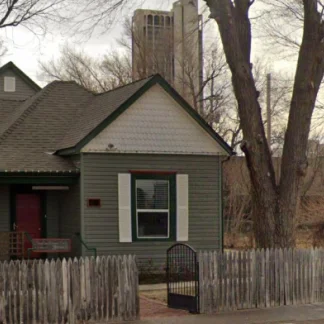AA - Alcoholics Anonymous - South Taylor Street
AA – Alcoholics Anonymous – South Taylor Street is a non-profit rehab located in...
DWC - ABBA House is a program provided by Downtown Women's Center, and seeks to help homeless women with children. DWC - ABBA House is located in Amarillo, Texas.
At DWC – ABBA House, they believe in helping homeless women either with children or without children to become self-sufficient. They place an emphasis in helping for homeless women struggling with addiction helping them to achieve long lasting recovery and teaching them important live skills.
At ABBA House, women are required to work with a case manager, attend required meetings, attend and graduate from ARAD (Amarillo Recovery from Alcohol and Drugs), arrange for child care, find a part-time job before moving to Gratitude House after a stay of 4-6 months.
Contact us for more information: (806) 372-3625

Connect with DWC - ABBA House by calling their admissions team directly.
(806) 372-3625 Website Get DirectionsState Licenses are permits issued by government agencies that allow rehab organizations to conduct business legally within a certain geographical area. Typically, the kind of program a rehab facility offers, along with its physical location, determines which licenses are required to operate legally.
State License: Texas License Number: 29115226
Group therapy is any therapeutic work that happens in a group (not one-on-one). There are a number of different group therapy modalities, including support groups, experiential therapy, psycho-education, and more. Group therapy involves treatment as well as processing interaction between group members.
In individual therapy, a patient meets one-on-one with a trained psychologist or counselor. Therapy is a pivotal part of effective substance abuse treatment, as it often covers root causes of addiction, including challenges faced by the patient in their social, family, and work/school life.
Life skills trainings involve all the skills a person must have in order to function successfully in the world. These include time management, career guidance, money management, and effective communication. Truly successful addiction recovery is based on the ability to not only live substance-free, but to thrive. Life skills teaches the practical necessities of functioning in society, which sets clients up for success in life, and therefore sobriety.
In individual therapy, a patient meets one-on-one with a trained psychologist or counselor. Therapy is a pivotal part of effective substance abuse treatment, as it often covers root causes of addiction, including challenges faced by the patient in their social, family, and work/school life.
Life skills trainings involve all the skills a person must have in order to function successfully in the world. These include time management, career guidance, money management, and effective communication. Truly successful addiction recovery is based on the ability to not only live substance-free, but to thrive. Life skills teaches the practical necessities of functioning in society, which sets clients up for success in life, and therefore sobriety.
Life skills trainings involve all the skills a person must have in order to function successfully in the world. These include time management, career guidance, money management, and effective communication. Truly successful addiction recovery is based on the ability to not only live substance-free, but to thrive. Life skills teaches the practical necessities of functioning in society, which sets clients up for success in life, and therefore sobriety.
AA – Alcoholics Anonymous – South Taylor Street is a non-profit rehab located in...
Addiction Specialty Group is a private rehab located in Amarillo, TX. Addiction ...
Al – Anon is a non-profit rehab located in Amarillo, Texas. Al – Anon specialize...
Moss Lane Club is a drug and alcohol rehab center located in Amarillo, Texas. Th...